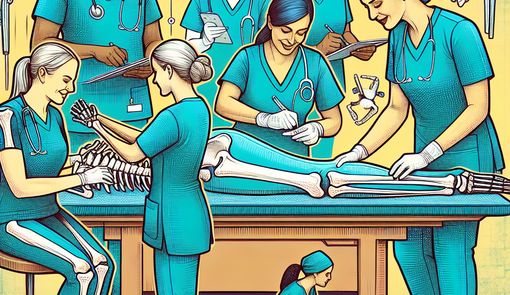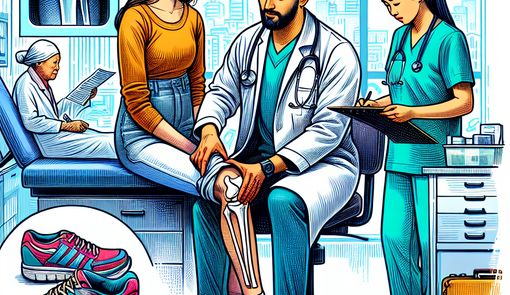Mapping Your Career Path to Become an Orthopedic Nurse Practitioner

Embarking on a career as an Orthopedic Nurse Practitioner (ONP) can be an especially rewarding journey. It combines the compassionate care of nursing with the specialized expertise required to manage musculoskeletal health issues. Orthopedic Nurse Practitioners offer essential services, ranging from injury prevention and managing chronic conditions to assisting in surgery and rehabilitation. If you are interested in joining this dynamic and growing field, mapping out the steps and education you'll need is crucial to your success. Here is an in-depth look at what it takes to achieve this distinguished role in healthcare.
Understanding the Role of an Orthopedic Nurse Practitioner
An ONP is an advanced practice registered nurse (APRN) who has specialized in orthopedic medicine. In this capacity, the ONP works with patients who have a variety of musculoskeletal problems, including fractures, arthritis, osteoporosis, and sports injuries, among other conditions. Their duties involve conducting assessments, reviewing diagnostic tests, developing treatment plans, prescribing medications, and performing certain procedures. They work in collaboration with orthopedic surgeons, physical therapists, and other healthcare professionals to offer integrative care that promotes optimal patient outcomes.
Educational Requirements
The first step to becoming an ONP is to become a Registered Nurse (RN). This involves completing an accredited nursing program—either an Associate's Degree in Nursing (ADN) or a Bachelor of Science in Nursing (BSN). A BSN is increasingly becoming the preferred degree due to the more extensive training it offers and the wider opportunities it provides for career advancement.
Upon obtaining RN licensure, individuals must gain clinical experience, preferably in an orthopedic setting. While there is no standard requirement for the number of years needed, a general guideline is to accumulate a minimum of two years of full-time nursing experience in orthopedics.
Advancing to an ONP requires further education—a Master of Science in Nursing (MSN) or Doctor of Nursing Practice (DNP) with a specialization in orthopedics. These graduate programs typically include courses in advanced physiology, pharmacology, diagnostics, and focused training in musculoskeletal health. Many programs also require students to complete a set number of clinical hours under the supervision of seasoned orthopedic healthcare professionals.
Certification and Licensure
After graduating from an APRN program, aspiring ONPs must obtain national certification through an accredited organization such as the Orthopaedic Nurses Certification Board (ONCB). Certification usually requires passing an examination that covers orthopedic nursing practices and principles.
In addition to national certification, all nurse practitioners, including ONPs, must become licensed in the state where they will practice. State licensure requirements vary, but generally include holding national certification, demonstrating a minimum level of education, completing a certain number of clinical hours, and maintaining RN licensure.
Continuing Education and Specialization
Continual learning is a cornerstone of the nursing profession, and ONPs are no exception. They are expected to engage in continuing education to keep their skills sharp, remain current with the latest treatments and technologies in orthopedic care, and to fulfill renewal requirements for licensure and certification. ONPs may choose to specialize further by focusing on specific patient populations (such as pediatrics or geriatrics) or types of care (sports medicine, trauma, etc.).
Career Advancement Opportunities
With experience, ONPs may pursue roles in leadership, education, research, or policy development within healthcare institutions, universities, or professional organizations. Through additional credentials or degrees, some may even transition into related fields such as healthcare administration or consulting.
The Employment Outlook and Salary Expectations
The demand for nurse practitioners, including orthopedic specialists, is growing. The aging population and increased focus on team-based models of care contribute to this demand. According to the Bureau of Labor Statistics (BLS), employment of nurse practitioners is projected to grow by 52% from 2020 to 2030, much faster than the average for all occupations. Salaries for ONPs are competitive, with median annual wages typically higher than those for RNs due to their advanced level of practice.
Challenges and Rewards
Becoming an ONP is not without its challenges; it requires considerable dedication to education and clinical practice. However, the rewards are plentiful. ONPs enjoy autonomy in their work, the ability to make significant impacts in patients' lives, and opportunities for professional development.
Conclusion
Embarking on the path to becoming an Orthopedic Nurse Practitioner requires detailed planning and commitment. By understanding the necessary steps—from education and licensure to certification and specialization—ambitious nurses can pave the way for a fulfilling and impactful career in orthopedic care. While the journey may be rigorous, the destination is a career that is professionally rewarding and in high demand.
**Frequently Asked Questions:
**Q: What is the role of an Orthopedic Nurse Practitioner (ONP)? A: An ONP is an advanced practice registered nurse specializing in orthopedic medicine. They work with patients suffering from musculoskeletal issues, providing assessments, treatment plans, and collaborating with healthcare professionals for comprehensive care.
**Q: What are the educational requirements to become an ONP? A: To become an ONP, individuals need to start as a Registered Nurse (RN) with either an Associate's Degree or Bachelor of Science in Nursing. Advanced education through a Master of Science in Nursing (MSN) or Doctor of Nursing Practice (DNP) with an orthopedic specialization is essential.
**Q: How can I become certified as an Orthopedic Nurse Practitioner? A: To become certified, aspiring ONPs must pass an examination through organizations like the Orthopaedic Nurses Certification Board (ONCB). State licensure is also necessary for practice.
**Q: What are the career advancement opportunities for ONPs? A: ONPs can advance into leadership, education, research, or policy roles in healthcare. Specializations in specific patient populations or types of care are also common.
**Q: What is the employment outlook for Orthopedic Nurse Practitioners? A: The demand for nurse practitioners, including ONPs, is increasing, with projected growth rates higher than average. ONPs also enjoy competitive salaries compared to Registered Nurses.
**Q: What are the challenges and rewards of being an ONP? A: Becoming an ONP requires dedication to education and practice, but offers autonomy, professional impact, and opportunities for growth.
For more information and resources about becoming an Orthopedic Nurse Practitioner, check out the following links:
- American Association of Nurse Practitioners (AANP) Orthopedic Specialty Practice Group
- ONCB Certification Exam Preparation Materials
- Bureau of Labor Statistics Occupational Outlook Handbook for Nurse Practitioners
Further Resources
For readers interested in pursuing a career as an Orthopedic Nurse Practitioner, here are valuable resources to aid in your journey:
- American Association of Nurse Practitioners (AANP): The AANP offers a wealth of resources for nurse practitioners, including networking opportunities, educational events, and updates on regulatory issues affecting the profession. Visit their website for more information.
- Orthopaedic Nurses Certification Board (ONCB): Aspiring ONPs can find certification requirements and study materials on the ONCB's official site. Stay updated on certification processes and exam schedules.
- National Association of Orthopaedic Nurses (NAON): Join NAON to connect with orthopedic nursing professionals, access educational materials, and stay informed about industry trends. Check out their website for membership details.
- American Nurses Association (ANA): The ANA provides resources for professional development, advocacy, and continuing education for nurses at all levels. Explore their platform for career support.
- Orthopedic Nursing Journals: Keep abreast of the latest research and best practices in orthopedic nursing by subscribing to journals such as the Orthopedic Nursing Journal and Journal of Orthopaedic Nursing. Access these journals through academic databases or professional subscription services.
- Continuing Education Providers: Look for accredited providers of courses and workshops focused on orthopedic nursing. Platforms like Medscape and Nurse.com offer a variety of education modules to enhance your skills and knowledge.
- Professional Conferences and Events: Attend orthopedic nursing conferences and events to network with peers, learn from experts in the field, and stay updated on advancements in orthopedic care. Check websites like Nurse Practitioner Healthcare Foundation for upcoming events.
- Online Forums and Communities: Engage with other ONPs and orthopedic healthcare professionals through online forums like Allnurses and Orthogate. Share experiences, seek advice, and build a supportive network within the orthopedic nursing community.
- LinkedIn Groups: Join LinkedIn groups dedicated to orthopedic nursing and nurse practitioner specialties. Connect with professionals, participate in discussions, and stay connected to industry news and job opportunities.
- Textbooks and Reference Materials: Invest in authoritative textbooks on orthopedic nursing, advanced practice nursing, and musculoskeletal health. Resources like Orthopaedic Nursing Secrets and Orthopaedic and Trauma Nursing provide valuable insights for ONPs at all stages of their career.
These resources offer a comprehensive support system for aspiring and practicing Orthopedic Nurse Practitioners, helping them stay informed, connected, and continuously learning in this specialized field.






